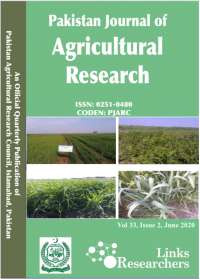Exogenous Application of Proline to Enhance Rice Tolerance against Heat and Drought Stresses
Exogenous Application of Proline to Enhance Rice Tolerance against Heat and Drought Stresses
Sajid Hanif1, Abdul Shakoor1,4*, Muhammad Farrukh Saleem1, Ifra Saleem2, Sajid Ali3, Muhammad Awais Ashraf4, Majid Nadeem4, Hira Shair4, Anwar ul Haq5, Rana Abdul Hamid Khan6 and Muhammad Amir Amin7
ABSTRACT
Environmental stresses and changing climate scenarios are the foremost intimidation to sustainable crop production. Among abiotic stresses, heat and drought stresses instigate substantial rice yield reductions. A pot trial was laid out to observe the efficacy of foliar spray of proline on rice in the alleviation of both heat and drought effects in rice. Pot experiment was laid out in Kharif season 2018 inside the glasshouse of University of Agriculture Faisalabad. Treatments viz., control (no stress imposition) and stress treatments viz., drought; heat and combination of drought + heat stress effects were imposed at anthesis. Three different levels of foliar-applied proline included water spray, 10, 20 and 30-mM concentrations. Combined heat and drought stress increased unfertile tillers, unfilled grains and abortive, chalky and opaque kernels, along with declines in chlorophyll and relative leaf water contents (14% over control) the most than individual stress imposition. A 29.76% increment in yield was observed as comparison to to (control) by the use of exogenous proline and its quality attribute due to improved chlorophyll and relative leaf water contents (10% increase) alongside reductions in undesired quality parameters like chalkiness, opaqueness and abortive kernels. Concurrent heat and drought stress were the most hazardous as comparison with individual stress and 30 mM proline utilization gave more amelioration against stress.
To share on other social networks, click on any share button. What are these?







